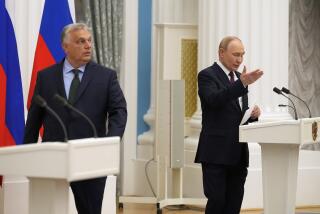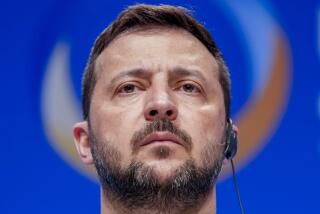Gorbachev Asks Unity, Calls Critics Neo-Bolsheviks in Byelorussia Trip : Soviet Union: The Communist leader also assails Russian President Yeltsin and plans to visit areas affected by the accident at Chernobyl.
- Share via
MOSCOW — Live, or nearly so, Mikhail S. Gorbachev’s roadshow returned to the airwaves Tuesday evening after a prolonged absence as the Soviet president flew to Minsk to hobnob with Byelorussians and to assail his critics on the left as “neo-Bolshevik” covert capitalists.
In fighting form and general good humor, Gorbachev, who will turn 60 this Saturday, plunged into a televised whirlwind of activities that would have seemed suspiciously like crass electioneering had they been performed by a politician in the West.
Perhaps it was politicking--Gorbachev, battling the forces tearing his country apart, wants Byelorussians and all other citizens to vote in favor of a renewed Soviet Union in a referendum scheduled for March 17. In a three-day visit to Byelorussia, he is to tour areas contaminated by the Chernobyl nuclear power plant accident--his first visit since the disaster took place nearly five years ago.
In comments in Minsk reported by the official Tass news agency, Gorbachev said he favors “strong republics and a strong center,” a formula local nationalists say is arrant nonsense. He also got in his first public dig at Boris N. Yeltsin since the Russian president’s televised demand Feb. 19 that Gorbachev resign.
His Russian populist rival, Gorbachev told workers at the V. I. Lenin Tractor Plant in Minsk, has abandoned the cause of reform. Yeltsin’s views and acts “diverge from the path of perestroika. We see here two political lines, two programs,” he said.
In a speech to Byelorussian scientists and intellectuals, Gorbachev again trained his rhetorical fire on progressives, radicals and anti-Moscow separatists, saying their struggle for power throughout the country “threatens to push us off the road of reform onto the path of confrontation, right up to a civil war.”
In a bizarre turn of phrase, Gorbachev--general secretary of the Soviet Communist Party since March, 1985--accused progressives of using the same tactics as Lenin’s revolutionary comrades and obviously meant it as a damning indictment.
The radicals’ “neo-Bolshevik tactics,” Gorbachev said, include “transferring struggle to the streets, organizing demonstrations, rallies, industrial work stoppages, hunger strikes and creating a psychological atmosphere that would unsettle both the people and members of other political movements.”
“Over the past several weeks, we have been able to watch the peak of these tactics,” Gorbachev declared from the podium of the Byelorussian Academy of Sciences, with a large, white bust of Lenin behind him. “Upon interpreting in a distorted way the events in the Baltics and then the federal authorities’ actions to strengthen law and order, the rightists raised a hue and cry about a looming dictatorship and even the threat of a coup d’etat.”
By referring to the “rightists,” Gorbachev was trying to force a change in Soviet political terminology that generally labels Communists and other pro-Moscow forces as conservatives. The so-called radicals, Gorbachev charged, are in fact right-wingers, since they “reject the socialist idea and favor the capitalization of society.”
“There is no need to wonder that these ‘democrats’ enter a political alliance with separatists and nationalist groups,” Gorbachev asserted. “They have one aim in common--to weaken and, if possible, to dismantle the union.” He said that “millions of Communists” were more deserving of the label “democrat” than Yeltsin and his allies.
It was January, 1990, when Gorbachev last ventured outside the Russian heartland to press the flesh of the locals, when he flew to Lithuania. By all accounts, that trip was a shock--people in the Baltic republic told Gorbachev they wanted nothing less than independence, and the whole nation, thanks to state-run television, saw the frosty welcome given to their president.
In November, Gorbachev had been scheduled to visit strife-torn Moldova but canceled the trip after two main nationalist factions in the southern republic’s Parliament threatened to boycott his speech there. The last time he went on a domestic trip was Aug. 17, when he left the Black Sea resort where he was on summer holiday to speak to soldiers in the port city of Odessa.
The problems encountered in Lithuania and Moldova may have decided Gorbachev in favor of Byelorussia, a Slavic republic that has been nicknamed the “Vendee of perestroika ,” in a reference to a French province that fiercely resisted the ideals of the French Revolution.
On a day when most of the world was holding its breath over the possible end of the Persian Gulf War, “Vremya,” the evening television news program, led off with an extensive report on Gorbachev’s Byelorussia trip. Wearing a gray seal hat and looking much more robust than he has in recent weeks, Gorbachev stepped off his presidential airliner at the Minsk airport and was given the traditional Slavic welcome of bread and salt.
Soviet TV later showed Gorbachev’s speech to the Byelorussian intelligentsia in its entirety. The Byelorussia trip could herald a new round of pre-referendum stumping across the country. Gorbachev’s spokesman, Vitaly N. Ignatenko, told reporters in Moscow that a trip to the Central Asian republic of Kazakhstan is planned.
More to Read
Sign up for Essential California
The most important California stories and recommendations in your inbox every morning.
You may occasionally receive promotional content from the Los Angeles Times.













